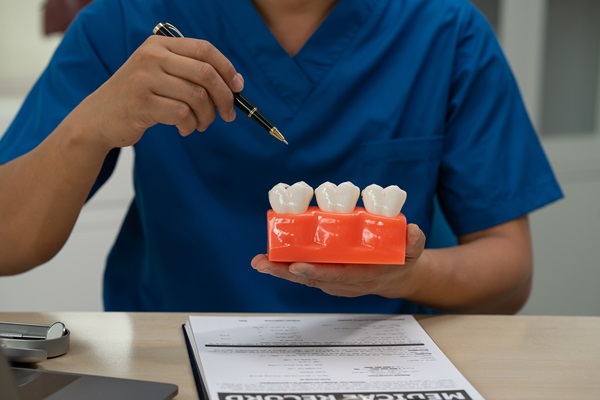How Is a Dental Implant Placed?

No one should have to live with missing teeth, and if you are not comfortable wearing dentures, then dental implants may be the best way for you to replace one or more missing teeth. Learn more about how dental implants are placed before deciding if you should visit a dentist for implant treatment.
A review of the dental implant procedure and process
Dental implants require a more extensive process than dentures. However, the dentist monitors each step for optimal safety and effectiveness. The following is a review of what you (the patient) can expect when preparing for dental implant placement, during the placement procedure and while recovering afterward.
Preparing for dental implant placement
During the consultation, the dentist checks the periodontal health of the patient to determine if they need a bone grafting procedure, gum disease treatment, etc. If necessary, the bone grafting procedure is scheduled on the first or second visit. This ensures that there is enough healthy bone there to support the dental implant. Once the patient has ideal oral health, a visit is scheduled for the placement of the dental implant.
Before the implant placement procedure
The patient should follow all instructions provided by the dentist or oral surgeon before the day of implant placement. Also, patients should ask questions to ensure that they are comfortable and prepared for the day of dental implant placement. The night before the procedure, patients should get a good night of rest. It may also help to play a board game or do something else fun with the family to stay calm and relaxed the night before.
During the implant placement procedure
A dental implant is placed by making an incision into the gums to access the underlying jawbone. The dentist or oral surgeon then drills a small hole into the bone and places the implant deep into the bone. The patient is placed under anesthesia so they do not feel anything during the procedure itself, although they may experience discomfort after they regain consciousness.
What to expect after implant placement
There is typically pain and swelling in the affected area following the placement procedure. Pain, swelling, occasional bleeding and various other symptoms may persist for a couple of weeks. Subsequently, many dentists recommend a soft diet and give strict instructions for keeping the mouth clean to prevent an infection or failed dental implant. Patients should also reduce the risk of a blow to the mouth by limiting physical activity until the mouth heals and wearing a nightguard if they grind their teeth while asleep. Once the mouth heals, a second procedure is scheduled to place the abutment and artificial tooth.
Are you interested in dental implant placement?
You can schedule a consultation with our friendly dental team by giving us a call today. We are glad to address your initial questions and arrange a convenient time for you to meet with us to discuss dental implant treatment and put together a personalized treatment plan just for you.
Request an appointment here: https://clearcreekdentistry.net or call Clear Creek Dentistry at (360) 692-6332 for an appointment in our Silverdale office.
Check out what others are saying about our dental services on Yelp: Dental Implant in Silverdale, WA.
Recent Posts
Dental implants are a great way to replace multiple missing teeth. A dental bridge is also a solution for multiple teeth replacement in many cases as well. By learning more about the pros and cons of each option, it will help you decide which treatment option is right for you. Missing teeth create a cosmetic, functional…
Talk to any dentist about missing teeth solutions and dental implants will be one of the first options they bring up. There are many good reasons for this. Implants are the only oral prosthetic that replaces missing teeth roots and they prevent the bone tissue loss that normally takes place when you lose some of…
You can get a dental implant (or multiple dental implants) in less than six months. While many patients understand the benefits of a dental implant, many often avoid treatment out of fear that the process is too invasive or takes too long. This review explains what you can expect throughout the treatment process. Getting a dental…
Thinking about choosing dental implants to address your missing teeth problem? Even missing just one tooth can cause someone to experience multiple dental problems, e.g., shifting teeth, headaches, uneven tooth wear. According to the American Dental Association, the average adult between the ages of 20 and 64 has three or more decayed or missing teeth.Understanding…


